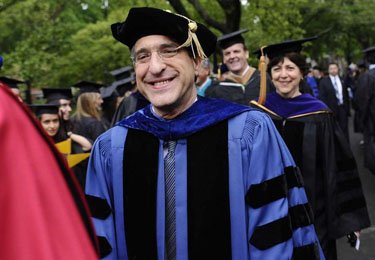Is Peter Salovey’s Era of Misrule at Yale Coming to an End?
Calhoun College, Freshman Commons, Let's Hang Peter Salovey From a Sour Elm Tree, Peter Salovey, Political Correctness, The Christakises and the Shrieking Student, Yale
Michael Rubin (DP ’94) provides a nearly complete list of Peter Salovey’s atrocities as President of Yale and reports that the chickens are finally coming home to roost: big donors are declining to support the Salovey regime.
He threw respect for free speech and decorum under the bus when he compelled the resignation of Silliman College master Nicholas Christakis in the face of the “shrieking girl†controversy. He legitimized violence when he rehired a dishwasher who smashed a historic stained glass window. In general, he catered to the loudest on campus, always willing to grease the squeaky wheel regardless of the consequence.
When students complained that the term “freshmen” disrespected women and “master” made African-Americans uncomfortable, he simply ordered their change, never mind that it was he who was racializing a term that had ancient collegiate roots. That Yale continues to issue master’s degrees only highlights the lack of intellectual consistency.
Then, when decades-long student protests persisted with regard to a residential college named after 19th century statesmen and Vice President John Calhoun due to the support Calhoun professed during his lifetime for slavery, Salovey first said he would keep the name out of respect for history but, when criticized by student activists, convened a handpicked and Orwellian “ Committee to Establish Principles on Renaming†which recommended changing the name of the college. The problem with such a move was not simply the willingness to erase history at one of the nation’s most elite universities, but also intellectual inconsistency: Calhoun may have provided intellectual sustenance to the pro-slavery south, a not uncommon position at the time, but Elihu Yale, after whom the entire university is named, actually traded slaves during his lifetime.
Salovey’s hostility toward history has extended further to university tradition. Yale long prided itself on being centered on its undergraduates. Admissions officers sang the merits of residential colleges, each a unique community within the broader university. But, Salovey, who did not attend Yale as an undergraduate, homogenized the colleges in order to eliminate any differences between them. While the freshmen class dined together in “University Commons†since 1901, he closed the iconic dining hall in order to build a student center whose need (or need in that location) most students (let alone alumni) continue to question. Most recently, Salovey has put the open stacks of Yale’s underground library on the chopping block.
Now, it seems that the university is paying the price for Salovey’s general gutlessness. Yale has, for years, been seeking to undertake a major capital campaign. Often, universities announce their campaigns after a silent stage in which they get high-profile donors to commit to the effort. According to staffers within Yale’s fundraising arm, the university was forced to delay its campaign for several years because big donors are rightly worried about Yale’s direction and its tendency to prioritize politics above academics.
Yale’s embrace of identity politics reinvigorates self-segregation and pits groups against each other. An ever-expanding array of ethnic deans spoon feeds ideology to students rather than make them organize for themselves. Yale administrators, largely for political reasons, increasingly seek to weigh in on the private lives of students off campus. Donations are declining as faculty and student antics increasingly hit national headlines or the courts. Giving in the first quarter of the last fiscal year, for example, is lower than in the period for the four previous years.
Yale is also falling behind in fundraising among its peer group of universities as alumni decide not to give. Older alum largely disagree with the direction of the university as it subordinates academe to social action, while the younger alumni whom Salovey sought to appease do not understand why they should donate to a university with a nearly $30 billion endowment. Rather than question fundamentally why the money is no longer rolling in, the university’s response is simply to cease reporting donation statistics.
While Yale cultivates a reputation as an educational and intellectual center, its emphasis under Salovey has been more about politics and social justice. The university trumpets ethnic, religious, and sexual orientation diversity, but shuns intellectual diversity which arguably should trump every other kind.
Perhaps the decline in donations is a sign that Yale’s, and, by extension, other elite universities’, ability to coast on reputation while treating its core education mission with disdain has come to an end. Perhaps it is time for Salovey to resign.
Michael Rubin was himself too-PC to include in Salovey’s list of crimes the naming of one of the two new residential colleges for a black lesbian communist whom nobody outside the Radical Left had ever heard of.
Salovey’s concession to Charles Johnson ’54 of Franklin Resources, who ponied up the $250 million to build two new residential colleges in naming one of the new colleges after Benjamin Frankin, a particular hero of Johnson’s unfortunately lacking any meaningful connection to Yale, was regrettable, but comprehensible. He who pays the piper calls the tune and all that. But a lot of us would rather have seen New Residential College 2 named for “Benjamin Franklin’s Dog” instead of for an obscure agitator with only the tenuous connection of a post-Law doctoral degree acquired at Yale Law at the age of 55. Only Peter Salovey would overlook the opportunity to name one of two new colleges located at the foot of Science Hill for Josiah Willard Gibbs.




